
by Alison Fraser | Dec 2, 2013 | 2013, Africa, AIDS, Canada, Education, Girls, Human Rights, Humanitarian, Humanity, Inspirational, International, Kids, Life Lesson, ONE, Philanthropy, Poverty, Preschool, School, Social Good, Spirituality, Women's Rights, World Moms Blog, World Voice

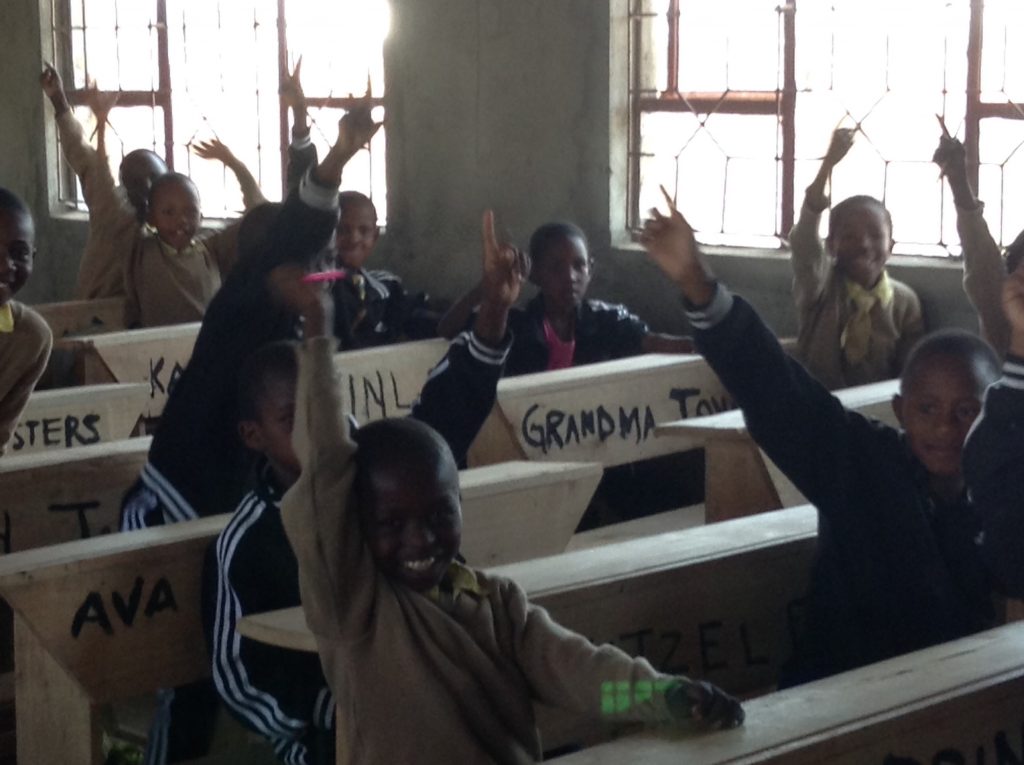
Photo by Alison Fraser
Anne Frank once said “No one has ever become poor by giving”. What a beautiful thought to keep in mind as we celebrate Giving Tuesday on December 3rd of this year. The act of giving can do wonders for a person’s spirit, soul and general well-being. Whether you give time, financial support, a lending hand, a listening ear or encouraging words, the act of giving is unique in that it often benefits the giver as much, or even more, than the receiver. This is something that I can attest to now more than ever before.
A few weeks ago, I visited Tanzania. I run a small Canadian Not for Profit Organization that works to fund the educational needs of women and children in and around Arusha. This was my first trip to Tanzania and the first time to meet all of the wonderful families that are involved in my organization. Helping these families has always made me feel good. I always felt like it was an equal partnership where I would provide financial assistance through fundraising in Canada and the Tanzanian women and children would allow me a glimpse into their life from afar. However, what I realized from spending ten days with these amazing people is that the partnership really isn’t equal at all. In fact, I truly believe that what I have received from these incredibly strong, spiritual, kind, compassionate and caring families is much more than what I have given them.
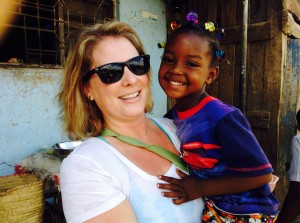
The author with a student in Tanzania.
Let me explain how the power of giving has changed my life. I donate countless hours of time to help those in the Mom2Mom Africa organization. Why? It makes me happy.
It fulfills me in ways that I can’t explain. I feel a sense of purpose, like I am making a difference, albeit very small, but nonetheless, a difference in the world. My charity work completes me and makes me feel like a whole person. I can’t explain why…it just does. But, the ten days that I spent in Tanzania last month, visiting families and spending time at the schools has changed my life forever. I have never experienced anything so powerful in all of my life. Yes, I gave up family time to spend in Tanzania and I gave up quite a bit financially to pay for the trip. But, NOTHING could prepare me for what I was given in return. My life has been changed by simply spending time with these families over the course of my time in Africa. They breathed fresh air and a new life into me by just being themselves. Their sense of community, their compassion towards one another, and their love of life despite many struggles has inspired me in ways that I still have yet to process and understand. The power of giving has never been more apparent to me. It can change lives. It has changed mine.
Today, on Giving Tuesday, I am begging you to give of yourself. Whether it be time, a lending hand or financial assistance…give.
Give to someone who may need your help, whether it be across the ocean or right in your backyard. What you will get back in return will outweigh what you have given. I can promise you that. Giving of oneself has the power to change the world in so many ways. It is reciprocal. What you put into giving, will come back to you in abundance.
That is the power of giving. Giving changes all lives involved. As Anne Frank also said, “How wonderful it is that nobody need wait a single moment before starting to improve the world”. So give. Change the world. You can do it. What may seem like a small act of giving can mean a world of difference to someone else.
On this Giving Tuesday, consider helping a family in Tanzania by purchasing a personalized desk for our schools, school uniforms, or school textbooks. You will bring a smile to the face of a child in Tanzania. And that, I guarantee, will bring a smile to your face, as well! Happy Giving Tuesday!
How do you plan to give back this Giving Tuesday?
This is an original post for World Moms Blog Written by Alison Fraser.
Alison Fraser is the mother of three young girls ranging in age from 5 to 9 years old. She lives with her family in Cambridge, Ontario, Canada. Alison works as an Environmental Toxicologist with a human environment consulting company and is an active member of the Society of Environmental Toxicology and Chemistry (SETAC). She is also the founder and director of the Canadian Not for Profit Organization, Mom2Mom Africa, which serves to fund the school fees of children and young women in rural Tanzania. Recently recognized and awarded a "Women of Waterloo Region" award, Alison is very involved in charitable events within her community including Christmas Toy and School Backpack Drives for the local foodbank.
More Posts - Website
Follow Me:



by Purnima Ramakrishnan | Dec 2, 2013 | Award, Childhood, Competition, Education, India, Inspirational, International, Kids, Life Balance, Life Lesson, Motherhood, Parenting, Purnima, The Alchemist, World Moms Blog, World Motherhood, Younger Children

“Education is the manifestation of the perfection already in man – Swami Vivakananda”
Sometime back I wrote about Abraham Lincoln’s letter to his son’s school teacher and my perspective and how it was appropriate for our lives here too. To bring up a good human being and to help him/her learn and get educated is the role of the parent and also the teacher at school.
Well, there were these competitions going on in my seven year old son’s school again, here, in India. This time it was Western Music. I am so fond of these musicals. My son sang some of my favorites and then Que Sara Sara and Rudolph the red nosed reindeer. He continued to the preliminaries, quarter finals, semi-finals and the finals. But one day while preparing for the finals at home, my son suddenly said, “Not all are going to win.”
I said, “Yes, they are not. But if you want to win, you need to practise.”
He was not the type of person who was interested to sing, but the type who loved to listen to music and songs. And I discovered this during this time.
“But amma, I don’t care.”
“Well, you should do your best. And then if you don’t get to win, that is fine. But you should not just give up.”
“I am not giving up. I just don’t want to sing.”
“Oh?”
Well, I was at a loss of words. I did not want him to do something he did not want to do. But then we were already into the finals, and I thought was it not a sheer waste if he did not even participate? This got me thinking…
The next day I found this quote in his school’s website.
Education is the manifestation of the perfection already in man – Swami Vivakananda.
We send our children to school for education and the teachers and parents are loving and affectionate and try to encourage the children to imbibe knowledge.
But then, what do they actually learn? Only what they chose to!
And also, sometimes they don’t learn and at other times they are very smart in academics. They also indulge in sports and other extra-curricular activities. We are happy, sometimes sad, and at times indifferent to various achievements, successes and failures and mediocre performances of our children. So many choices, actions, results, and yet Swami Vivekananda says we are all perfect.
If everyone is perfect, then where are the gaps? Why do only some people win? Why are there so many differences and scales of grades? ‘Manifestation’ is the significant word. What manifests out of a child is important. And whatever manifests, the society, the parents and the teachers are responsible to some extent. And then the children themselves are finally responsible. We bring up a child, giving him a lot of room to explore, think, discover and find joy, and, thereby, allow him to manifest his perfection.
I did not ask him to practise a lot for the singing competition. If he is not interested, let him not be. Maybe he is interested in building robots. Maybe he is interested in literary pursuits. Maybe he is interested in astronomy when he points out the pole star and Venus.
Because he is talented to sing, does not mean he should want to do it or become the next pop star. Whatever he allows to be manifested from himself, only will be, and I cannot force it.
And the reason for what he focuses on, no one can understand. It is his own mind acting under his own will and there are no explanations for that. So, let me not put a restraint to the manifestation of his perfection. Let him lay down his own options and channel his own interests.
In the end, he did end up participating in the finals, but without practising and the results are not out! But I shouldn’t care about the results because he doesn’t, right?
Is your child exercising independence in what he wants to do in life and what he wants to achieve? If so, are they different from what you think? And how do you handle it?
This is an original post to World Moms Blog by Purnima, our Indian mother writing from Chennai, India. Her contributions to the World Moms Blog can be found here. She also rambles at The Alchemist’s Blog.
Photo credit to Wiki Media Commons.
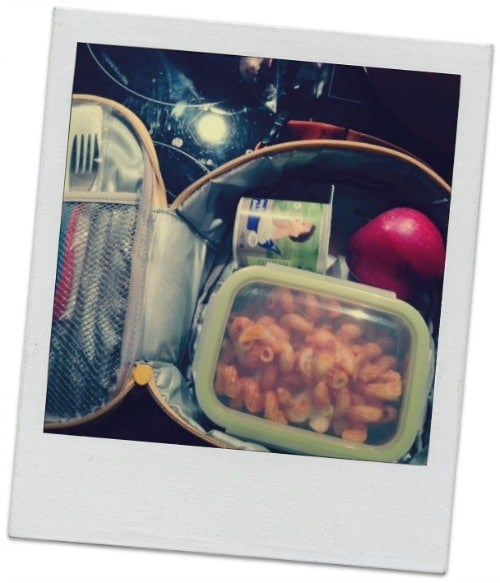
by Maman Aya (USA) | Nov 29, 2013 | Communication, Cooking, Education, Family, Health, Kids, Motherhood, Nutrition, Parenting, School, USA, World Motherhood, Younger Children
 For the last three years I have had to prepare lunch for my son to take to school with him. I always sent him a warm meal, in a thermos, usually comprised of leftovers or something that I would cook for him before school in the morning. I stood in the kitchen lovingly cooking his lunch every day. The only rules the school had were no nuts or candy. OK – easy enough, considering I always include fresh fruit and a salad and since I am conscience to buy organic whenever I can, I knew that he was having a balanced meal that was healthy and included some of the vital nutrients that his growing body needed.
For the last three years I have had to prepare lunch for my son to take to school with him. I always sent him a warm meal, in a thermos, usually comprised of leftovers or something that I would cook for him before school in the morning. I stood in the kitchen lovingly cooking his lunch every day. The only rules the school had were no nuts or candy. OK – easy enough, considering I always include fresh fruit and a salad and since I am conscience to buy organic whenever I can, I knew that he was having a balanced meal that was healthy and included some of the vital nutrients that his growing body needed.
This September, he started first grade, and the school rules changed. I am no longer allowed to pack his lunch, and he HAS to eat from the cafeteria.
The first graders need to learn responsibility and proper nutrition, so part of that lesson is allowing them to choose their food themselves.
I wouldn’t mind if they had the same organic, fruit and vegetable laden options that I would provide, but they don’t. Apparently they get organic “when they can”, and they try to make the parents feel better by saying that there is a “salad bar” available to the kids with baby carrots, tomatoes, cucumbers, hard boiled eggs and such available. They also have a “sandwich bar” where the kids can have their choice of bread like white sliced bread, bagels, whole wheat sliced bread, etc. (my kids have never had white sandwich bread in their life). They have cold cuts (I don’t ever buy cold cuts at home, since they are full of nitrates and sodium, if anything I would get fresh cooked chicken or turkey and slice it for a sandwich), and butter and jam available. They always have some kind of breakfast cereal (non-organic, mind you), and milk, juice, chocolate milk available to drink. Now to be fair, they have a “hot food bar” available as well, where the kids have a selection of hot foods available usually consisting of some protein, starch, vegetable, a soup, perhaps some pizza or pasta. (more…)

Maman Aya is a full-time working mother of 2 beautiful children, a son who is 6 and a daughter who is two. She is raising her children in the high-pressure city of New York within a bilingual and multi-religious home.
Aya was born in Canada to a French mother who then swiftly whisked her away to NYC, where she grew up and spent most of her life. She was raised following Jewish traditions and married an Irish Catholic American who doesn’t speak any other language (which did not go over too well with her mother), but who is learning French through his children. Aya enjoys her job but feels “mommy guilt” while at work. She is lucky to have the flexibility to work from home on Thursdays and recently decided to change her schedule to have “mommy Fridays”, but still feels torn about her time away from her babies. Maman Aya is not a writer by any stretch of the imagination, but has been drawn in by the mothers who write for World Moms Blog. She looks forward to joining the team and trying her hand at writing!
More Posts

by World Moms Blog | Nov 25, 2013 | 2013, Body Image, Child Care, Childhood, Communication, Cultural Differences, Education, Eye on Culture, Family, Guest Post, Kids, Language, Life Balance, Motherhood, Parenting, Preschool, Relationships, School, Sex, Sexuality, Traditions, Uncategorized, Women's Rights, World Events, World Interviews, World Mom Feature, World Moms Blog, World Motherhood, Younger Children
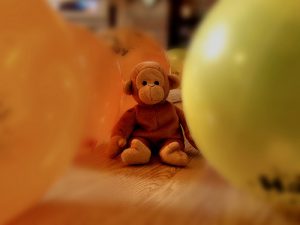 My neighbours in the Netherlands just had a baby and have proudly decorated their window with pink balloons and a garland saying: ”Hooray, a girl!”
My neighbours in the Netherlands just had a baby and have proudly decorated their window with pink balloons and a garland saying: ”Hooray, a girl!”
This would probably be shocking to a new category of Swedish parents, who refuse to reveal the sex of their baby to family and friends as well as to daycare staff. The baby is given a gender-neutral name, and will be dressed in anything but pink and light-blue.
Why? The parents don’t want their child to be subjected to society’s division of human beings into male and female, claiming that the stereotypes linked to it limit the child’s freedom.
While this remains rather rare, there is a rapidly increasing number of preschools in Sweden where gender equality is the main ideological and educational basis.
In these schools, the staff strives to treat girls and boys equally in all respects. They don’t hide the fact that both sexes exist, but don’t make a point of it and won’t encourage the children to play and behave in a way that is typical for their sex. They won’t call them girls and boys, but refer to them as ”friends” or ”children”.
Conveniently enough, a new pronoun is making its way into the Swedish language: ”hen”, meaning both ”he” and ”she” (”han” and ”hon” in Swedish). When the practice of using ”he” for both sexes in law texts was changed to the more cumbersome ”he or she”, texts became difficult to read and people started looking for other solutions.
The idea of ”hen” comes from the Finnish language (although Finnish is completely different from Swedish; its closest relative among European languages is Hungarian), which uses the pronoun ”hän” for both sexes. Apart from being used in texts to increase readability, the Swedish pronoun ”hen” is now used by advocates of gender neutrality.
The new pronoun and gender-neutral preschools are hot topics in Sweden right now. An increasing number of people like and make use of them, but a big part of the population is very critical towards them.
Sweden is one of the leading countries when it comes to gender equality. Thanks to the important work that has been done in this regard, women and men now basically have the same opportunities in all areas of life.
When gender equality turns into gender neutrality, however, are we still going in the right direction? Isn’t there a risk that gender-neutral treatment introduces another type of prejudice? When girls behave in a traditionally girly way, and boys behave in a traditionally boyish manner, will this be happily accepted or will they feel that their behaviour is wrong? Will there be a new ideal of tough girls and soft boys, as some critics fear?
How will children develop when their parents actively try to conceal what sex they are? Will they think that it’s bad to be a boy or a girl? Will they revolt against their upbringing and shower their own daughters with princess stuff, and their sons with cars and toy guns? Or will these children simply be freer and more unprejudiced than those who grow up in more traditional families, and contribute to a positive change in society?
Time will show.
What are you thoughts on this modern, Swedish approach to gender equality?
Kristina was born in Hamburg, Germany, but moved to Sweden at the age of 8 (her mother is German, her father Swedish). She studied French and linguistics and works as a translator. At the moment she lives in the Netherlands with her French husband and their two daughters, aged 17 months and 4 years. Kristina is interested in psychology and right now particularly focuses on child and family psychology. Working three days a week and being a full-time mom the remaining days, she doesn’t find as much time to read, write and practice yoga and music as she would like, but appreciates her early mornings in trains. There is nothing like contemplating an awakening landscape from a train with a cup of hot chocolate.
The image used in this post is credited to Jonathan Stonehouse. It holds a Flickr Creative Commons attribution license.
World Moms Blog is an award winning website which writes from over 30 countries on the topics of motherhood, culture, human rights and social good. Over 70 international contributors share their stories from around the globe, bonded by the common thread of motherhood and wanting a better world for their children.
World Moms Blog was listed by Forbes Woman as one of the "Best 100 Websites for Women 2012 & 2013" and also called a "must read" by the NY Times Motherlode in 2013. Our Senior Editor in India, Purnima Ramakrishnan, was awarded the BlogHer International Activist Award in 2013.
More Posts

by Ms. V. (South Korea) | Nov 19, 2013 | 2013, Education, Korea, South Korea, World Moms Blog, World Voice
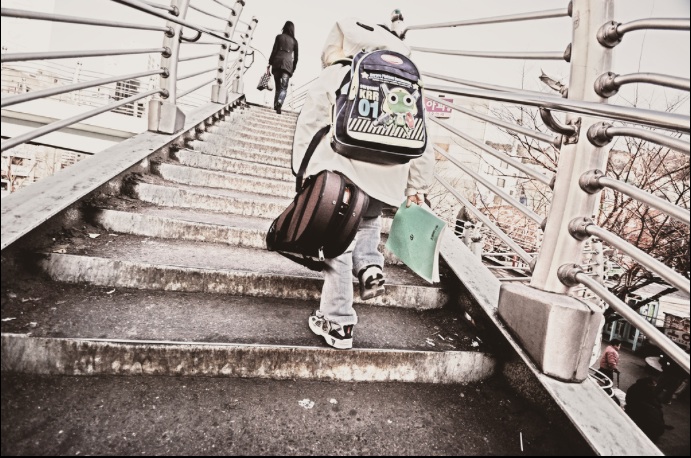
Photo Credit : Mafuyou/Flicker Creative Commons
Last week over 650,000 South Korean students took their college entrance exams. To give you an idea of how important this day is to Korean families, consider the following: banks and government offices open late, air traffic is rerouted, extra metro trains and buses are added to the schedule, and police officers are deployed to ensure that students arrive on time for the exam. In addition to this many of the parents of these students spend the 100 days leading up to the exam fervently praying at temple, performing 3,000 bows for good luck.
What is perhaps most striking about this yearly ritual, as an outsider looking in, is how everyone in the country sees it as their duty to ensure that these students make it on time and do well on their exams. The amount of pressure to succeed academically is unlike anything I’ve ever witnessed.
South Korea does indeed lead the world in measurable academic success. They have one of the highest rates of literacy in the world, in addition to scoring very high on international standardized tests, especially when compared to Western nations. Unfortunately, South Korea also leads in the world in another unfortunate and surprisingly related area: suicide.
As of 2011, suicide is the leading cause of death among South Koreans under the age of 40. In the age group from 15-24, worry over academic performance is cited as the reason. Every year after the exams there are reports of these “Exam Suicides”.
Suicide affects every culture, not just this one, but it is deeply troubling to observe just how widespread it is here, not only among young people, but within the general population as well. Long seen as a private and personal issue, the government has finally taken steps in recent years to stem the tide. There are call centers and prevention groups receiving government funding, as well as dedicated employees who search the internet and social media for suicide-related posts. Within the last few months a specific type of pesticide was banned, as it had been commonly used in suicides.
Preventing access to means and providing support will be effective up to a point, but perhaps a closer look must be taken at the cultural obsession with academic success. I was thinking of all those kids taking the test last week, wondering how it must feel to know that the entire country is invested in how you do on this test. Such immense pressure! I can’t even imagine.
As I have mentioned in previous posts, South Korea is at a very interesting point culturally. It has rapidly modernized and continues to do so while still having deep roots to the Confucian principles that have guided society for generations.
It is the intersection of new economic realities and globalization with older traditions of filial piety and family honor that seem to be most challenging to navigate.
As long as suicide is seen as an honorable exit because of failure to live up to expectations or, in the case of older people, to unburden the family from the need to provide for aging relatives, the numbers will at the very least remain somewhat steady. As the culture changes, so too will the rates of suicide, I suspect.
But how many people’s children will die in the meantime?
The results of the exams will be announced on November 27th. Until then, we all wait, hope, and pray.
This is an original post written for World Moms Blog by S. Korean Contributor Ms. V.
Do you think it is possible to have such academic success without all the pressure?
Ms. V returned from a 3-year stint in Seoul, South Korea and is now living in the US in the beautiful Pacific Northwest with her partner, their two kids, three ferocious felines, and a dog named Avon Barksdale. She grew up all over the US, mostly along the east coast, but lived in New York City longer than anywhere else, so considers NYC “home.” Her love of travel has taken her all over the world and to all but four of the 50 states.
Ms. V is contemplative and sacred activist, exploring the intersection of yoga, new monasticism, feminism and social change. She is the co-director and co-founder of Samdhana-Karana Yoga: A Healing Arts Center, a non-profit yoga studio and the spiritual director for Hab Community. While not marveling at her beautiful children, she enjoys reading, cooking, and has dreams of one day sleeping again.
More Posts
Follow Me:


by hjunderway | Nov 18, 2013 | 2013, Bilingual, Cultural Differences, Culture, Education, Expat Life, Eye on Culture, France, International, Living Abroad, Milestones, Motherhood, Moving, Preschool, Relocating, School, Stress, Traditions, USA, Working Mother, World Moms Blog, World Motherhood, Younger Children
 The day I gave birth to my son, HJ, is a day I’ll never forget. Induction nightmare? Check. Post baby snuggles? Check. September 3rd birth date? Check.
The day I gave birth to my son, HJ, is a day I’ll never forget. Induction nightmare? Check. Post baby snuggles? Check. September 3rd birth date? Check.
Little did I know at the time how much my son’s birthday would impact his development and education but flash forward to 2013 and here I sit, faced with the first of many educational concerns.
Living in Paris meant that on September 4th, 2012, my son formally entered the French education system. At just three years old, he was invited to attend nursery school, or maternelle, which comprises the first three years of schooling. Due to his inability to speak French, my son was invited to attend school four mornings per week from 8:30 a.m. until 11:40 a.m. As he began to thrive in school, his teacher gently suggested that I begin leaving him for one full-day per week after the holiday break in December. By late-January, he was attending school all day until 4:15 p.m., eating French catered lunch in the cantine (cafeteria), enjoying rest time, and thriving.
Combining his easy going attitude and tall stature (95% percentile for height), most parents thought my son was one of the older kids in the class. In order to start school in September, children must turn three by December 31st, and with a September 3rd birthday, my son was one of the younger students. When I would share this with the parents, they’d say, “Wow, but he is so tall!”
Our plans for HJ’s education were that he would be in French school until we moved home, and at that point he’d transition into kindergarten at the local school. When our contract ended sooner than expected, I began the joyous task of figuring out what options we had to continue HJ’s formal education, and the results were shocking.
HJ misses the US cut-off for kindergarten by two days. This means that he has to wait until he is six to enter kindergarten! I neatly placed that reality aside and instead focused on what education he could receive now, at four years old.
My choices floored me.
Option A) the public school offers a “lottery” for kids ages 3-4 for preschool, and the schedule only allows kids to get one of three spots: two mornings from 8-11, three mornings, four afternoons, or five mornings. And all this for the staggering price of more than $6,000.
Option B) the local Montessori school, which has no openings until September of 2014, and again runs mornings only. Did I mention that they also refused to reveal the actual cost of the program?
And finally, Option C) a local Catholic school that offers five all-day classes for around $7,000.
So what’s the big deal?!
Children in France have access to all-day education beginning at age three for FREE, with master’s degree trained teachers. While every school isn’t as amazing as the one my son attends, the French may be on to something. For two working parents, morning-only, formal education settings are an inconvenience, and for single-income families, shelling out over $6,000 for a few hours a day may be too much.
All around the United States, parents are struggling with making hard financial decisions and I wonder if it seems fair that we have to do so when it comes to our children’s educations?
For us, having HJ evaluated and exploring how he measures up to his peers is one solution. How he falls in the range of social and emotional intelligence will give us a window into how he may fair in kindergarten and will be necessary if we plan on fighting the school district for a spot in kindergarten if it seems logical and appropriate for our son.
The second option is to just ride the wave and instead allow our six year old to join his peers, perhaps giving him a leg up on his classmates. Then I question, “Will he be bored?” “Too big?” At this point I’m just not sure which choice is best for our little guy but it did get my wheels moving, wondering about the significant differences in how each country approaches education. What is it like for children in Germany, or Canada? Do parents struggle with similar issues in Sydney, Australia?
So please, World Moms Blog readers, share your location/country’s educational process! When does school begin? When did your children start school? Anything you wish you could change about your child’s educational experiences?
This is an original post to World Moms Blog from Jacki, mother of one now living in XXX but formerly blogging from Paris, France.
Jacki, or “MommaExpat,” as she’s known in the Internet community, is a former family therapist turned stay-at-home mom in Paris, France. Jacki is passionate about issues as they relate to mothers and children on both domestic and international scenes, and is a Volunteer Ambassador for the Fistula Foundation. In addition to training for her first half marathon, Jacki can be found learning French in Paris and researching her next big trip. Jacki blogs at H J Underway, a chronicle of her daily life as a non-French speaking mom in France.
More Posts













 For the last three years I have had to prepare lunch for my son to take to school with him. I always sent him a warm meal, in a thermos, usually comprised of leftovers or something that I would cook for him before school in the morning. I stood in the kitchen lovingly cooking his lunch every day. The only rules the school had were no nuts or candy. OK – easy enough, considering I always include fresh fruit and a salad and since I am conscience to buy organic whenever I can, I knew that he was having a balanced meal that was healthy and included some of the vital nutrients that his growing body needed.
For the last three years I have had to prepare lunch for my son to take to school with him. I always sent him a warm meal, in a thermos, usually comprised of leftovers or something that I would cook for him before school in the morning. I stood in the kitchen lovingly cooking his lunch every day. The only rules the school had were no nuts or candy. OK – easy enough, considering I always include fresh fruit and a salad and since I am conscience to buy organic whenever I can, I knew that he was having a balanced meal that was healthy and included some of the vital nutrients that his growing body needed.








